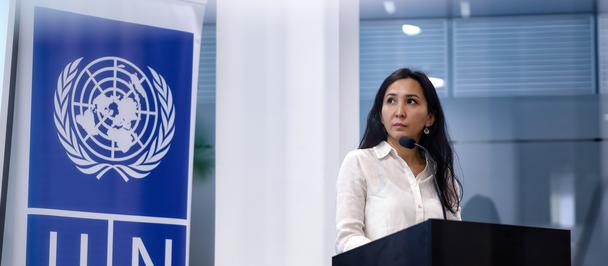According to the report by UN Women, the climate change emergency threatens progress toward gender equality. Gender-responsive approaches must not only explicitly recognise girls’ and women’s diverse and gender-specific interests and needs, they must also ensure their participation and leadership in developing, implementing, and monitoring mitigation and response actions. The statistics are stark: men are 75 percent of parliamentarians, hold 73 percent of managerial positions, are 70 percent of climate negotiators, and almost all of the peacemakers.
In honor of International Women's Day, women experts from Kazakhstan working on climate change took part in a social video to remind about the relevance of climate change, its impact on the lives of Kazakhstani people, and the important role of women in climate change policy.
Gulmira Sergazina, Climate change projects portfolio manager of UN Development Program in Kazakhstan:
“Climate change affects women and men in a different way. For example, women and children are 14 times more likely to die during devastating natural disasters. Society has recognized the vulnerability of women and children to climate change and their important role as agents of change.”
Pakizat Sailaubekova, Project Manager, an environmental consultant. Specialist in household waste management:
“Every year, 300 million tons of plastic trash is thrown away around the world. And just 5 percent of it is recycled effectively: most of it is simply incinerated or thrown away. About a third of all the trash ends up in nature, poisoning the ocean, the soil, and changing our environment.”
Zhanna Babagalieva, Expert on predicting climate change impact on water resources in Kazakhstan:
“According to forecast data, in Kazakhstan, an increase in air temperature of all water basins is expected. Then water consumption in major rivers will decrease by up to 20-30%. At the same time, water consumption in agriculture is expected to increase, due to the rising average annual temperature.”
Svetlana Dolgikh, PhD in Geography, Head of Climate Research Department, RSE Kazgidromet:
“The dangers of climate change are real – our planet is warming rapidly, by the middle of the century the country may face significant water shortages. Since the middle of the last century, each decade in the country has recorded warmer temperatures than the previous one. As a result, most of Kazakhstan's glaciers may melt completely by the end of the 21st century. Glaciers play a crucial role in the formation of rivers, lakes, and reservoirs.”

 Locations
Locations



